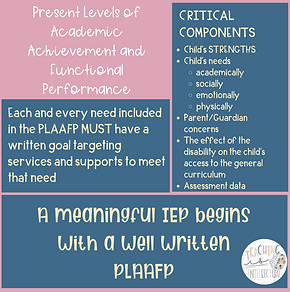Starting with the basics to ensure we have a mutual understanding of what IEPs are and are not.
The IEP is a legal document and every component of special education (beginning with the fact that it exists at all) comes through litigation and advocacy. We are accountable for the things we agree to and despite the fact that oversight and accountability is severely lacking, we, as professionals, must enter into IEPs with integrity and good faith.
IEPs are specific to the child. The tendency is to write goals (more on goal writing later) that are specific to the person responsible for the goal. So we have a “speech goal,” two “OT goals,” and two “academic goals.” We get it . . . BUT is that functional? Does speech operate in isolation from academics? Does OT matter if it isn’t applied to a skill of independence or context? The objective would be for us to build collaborative, functional, shared goals supporting the child’s access to the general curriculum.
Remember, an IEP is not a curriculum. It’s a plan for the services and supports the child needs to be success accessing the general curriculum. Yes, we offer adapted curriculum to some kids but an IEP in and of itself is not an adapted curriculum.
It’s also not a behavior plan.
When I teach IEPs, I have the students work through writing one on themselves. On their present levels, current needs, what supports and services would help them be successful. It helps to personalize the language we use, to focus on strengths, to shut down the deficit framing, because when it’s time to write one on a child, we need to see ourselves and the IEP as a support, not a fixer.
What questions do you have about IEPs?
We can’t get into goal writing without working on our PLAAFP/PLOP/PLP writing. All good goals start as clearly written PLAAFPs.
The words “functional performance” are important here. Working together as a team (WITH families) to ensure we’re addressing functional needs rather than isolated skills is truly the heart of the IEP.
I get lots of messages about how, yes, that’s ideal but not practical or what happens in practice. And I know. However, when we know better, we can do better and advocate for best practices. Here’s to the ones shaking it up out there!!
Lots of requests for goal writing strategies so we are working on some resources for that but in the meantime, what are IEP goals? Are they written for specific academic skills based on assessment data and deficits? Or are they written for providing the missing foundational skills the individual child needs to gain access to the curriculum? This is exactly why general ed teachers need to know about goals, IEP specific data collection, and accommodations and modifications. Supporting learners is all of our work!
This gives the IDEA charge for goals. The words here are important.
IDEA has four purposes. 1) equality of opportunity 2) full participation 3) independent living, 4) economic self sufficiency
It helps to keep the big picture in mind when writing goals.
More on this to come but for now, what have you found helpful in writing meaningful goals?



